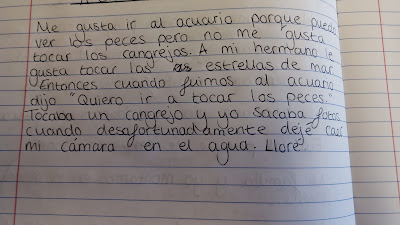Here's how I get Year 10 quickly up to speed with GCSE speaking and writing. They started in Year 9 with a lesson a week and covered some of the basics, but now we need to really get going. We are now at the stage where they have everything they need to do well in Speaking and Writing. And another year and a half just to get really good at using it.
Three lessons this week.
1. We worked on the core structures on their Test and Tick sheets. You have to be careful with this because if you say, "Tick all the words you know," it sounds like "Tickle the words you know." So then the Test and Tick sheet is only one step away from a testicle sheet, and that wouldn't do. Then we re-did a familiar listening from the textbook and harvested some verbs from it. Here they are on the board:
You can see, there is: Go to the aquarium, see the fish, touch the star fish, take photos, drop my phone, cry.Immediately you can see what is going to unfold. As a group, the pupils created a model answer on the board in Spanish, telling me what had to be in the story and how to say it in Spanish.
Here's what we wrote:
I like to go to the aquarium because I can see the fish but I don't like to touch the crabs [where did they come from?]. My brother likes to touch the starfish. So when we went to the aquarium, I said, "I want to go and touch the fishes." I was touching a crab and I was taking photos when unfortunately I dropped my camera in the water. I cried.
2. [Next lesson] When they came in, each pupil found written on their desk in board pen, one of these structures:
me gusta porque puedo
si... pero si... prefiero
a mi hermano le gusta fui/fuimos
quería dije dijo decidí
____aba/___ía ___é/___í
hubiera preferido
These were very deliberately in order around the classroom. And on the board were the infinitives from the aquarium story. First we went round the class and each pupil said in Spanish their part of the story: Me gusta ir al acuario ... ... porque puedo ver los peces...
The complete version is:
Me gusta ir al acuario porque puedo ver los peces sobre todo si llueve porque si hace sol prefiero ir a la playa. A mi hermano le gusta tocar las estrellas de mar. En el verano fuimos al acuario. Mi hermano quería tocar los peces. Dijo, "Quiero tocar una estrella de mar." Dije, "Yo no quiero." Decidí sacar fotos. Mi hermano tocaba una estrella de mar pero dejé caer mi móvil en el agua. Lloré. Hubiera preferido ir a la playa.
Each pupil in turn added their section as we went round the class in order, using the structure each pupil had on their table. And they felt very pleased with what they had done. Then it was time for Granny to go to market. We went round again. This time each pupil said their section. But then the next pupil had to repeat the story from the start, adding their chunk. Of course we went back to the first pupil and got them to do the whole thing! And they wrote it up in their books, comparing it to the version from the previous lesson.
3. Next lesson, after a bit of testing and ticking (careful!), I put these words, also from the textbook listening, on the board:
ir a un parque de atracciones comer helado
montar en una montaña rusa vomitar
In no time at all, we went round the class, each pupil building their part of the story using the same chunks (bad word given this story) as in the previous lesson. Then they worked on telling a partner the whole story. As they did this, they looked around the class at where the other pupils were sitting in order to remember what each person had added.
Now all of the class have a model answer that they can adapt to any topic. It is built around opinions and reasons, if sentences, differences of opinion, an example of what happened, a conflict, a conversation, a decision, what was happening, what happened, and what you would have preferred to have happened.
I wrote here about how my previous Year 10 got to the point where they would give me a topic to talk about. I would put the verbs on the board and they would improvise the story, either as a group or individually. And in the exam, all they have to do is visualise the class and remember what structure each pupil represents.
Update. Starting writing/speaking on a new topic (A school trip) 3 months later, pupils used their allocated expressions they have had since October and wrote this model answer. Individual answers on their own school trips to come next week...



No comments:
Post a Comment